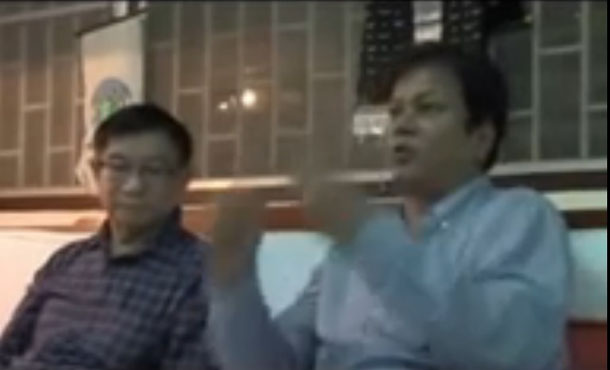RANGOON — A senior officer of the Kachin Independence Army (KIA) denied on Tuesday that the rebel group is cooperating with Rohingya groups after a video appeared online that showed the KIA officer meeting with Rohingya representatives and discussing cooperation in an armed struggle against the Burmese government.
The hour-long video, posted on Youtube on the weekend, shows several Rohingya representatives meeting with KIA Col. James Lum Daum in Thailand in March. They can be seen discussing the oppression of the Rohingya Muslims and Kachin minorities by the Burmese government.
At one point, Maung Kyaw Nu, chairman of the Burmese Rohingya Association of Thailand, appears to suggest that an armed struggle on behalf of the Rohingya, through a group known as the Rohingya Solidarity Organization (RSO), could take place from a base inside KIA-controlled territory.
“You all have an obligation to let us have accommodation, please let us know what type of accommodation you [the KIA] could provide,” he said.
James Lum Daum said solidarity between oppressed minorities in Burma is important and replied to the question, “We will consider your proposal and let you know our decision.”
More than a dozen ethnic minorities have been waging an insurgency against the Burman-dominated central government during past decades of military rule in an effort to seek autonomy. Many of the ethnic groups have cooperated during this period.
In recent years all ethnic armed groups, except the Kachin and the Palaung, have signed bilateral ceasefires with the government.
The Irrawaddy contacted both men in the video in Thailand on Tuesday. They offered differing accounts of the meeting and discussion, but denied that there is any active political or military cooperation between the KIA and an armed Rohingya group.
“There are no Rohingya in the KIA area; there are no Muslims from Arakan State in Kachin,” said James Lum Daum. He played down the significance of the meeting and said it was a dinner party to which he was invited by an American living in Thailand, Lance Woodruff.
“When I went, I didn’t know who would there and I was introduced to them,” he said of the Rohingya representatives, adding that the discussion focused on moral solidarity between minorities in Burma.
Asked whether the Rohingya leaders asked sanctuary in the KIA area to wage an armed struggle against the government, he said, “I have no authority to discuss that type of topic, and in case they requested it, there would be no promises.”
He added, “But there are several Arakanese [armed fighters] in Kachin.”
It has been known for some time that several hundred fighters belonging to the Arakanese Buddhist minority have received sanctuary and weapons training in the small, KIA-controlled parts of northern Kachin State. A recent report by Foreign Policy described the cooperation between the KIA and the Arakan Army in some detail.
“Those people are friends for several decades, there is a long history of cooperation between the Arakanese and the KIA—just like we have a long relationship with the Mon, the Karen, the Chin and so on,” James Lum Daum said.
The Arakanese are a predominantly Buddhist ethnic group who comprise the majority in western Burma’s Arakan State. They have been seeking greater autonomy from the central government for many years, and have also been involved in an inter-communal conflict with the Rohingya Muslims living in northern Arakan.
Maung Kyaw Nu, of the Burmese Rohingya Association of Thailand, said the meeting with James Lum Daum in March focused on a possible cooperation between an armed Rohingya group and the KIA, but that there was none at the moment.
He said that, like the Arakanese fighters, Rohingya groups might want a base for an armed struggle in KIA territory. He added, “I do not belong to the RSO… I only know about them through the news.
“We want a peaceful solution but if we cannot get it, maybe we will go to the KIA area and start an armed struggle,” he said.
Asked whether it would difficult for the Arakanese and Rohingya to both train in KIA area, Maung Kyaw Nu said, “The Arakanese are there, but we don’t care because our common enemy is the Burmese government.”
The Rohingya are a stateless minority that suffers persecution from the central government, according to the UN and international rights groups. They are also in conflict with the Arakanese and in mid-2012 violence exploded between the communities, leaving about 200 people dead and 140,000 people, mostly Rohingya, displaced.
The RSO was founded in the early 1980s to fight for the oppressed Rohingya. Experts have said the RSO received support and training inside Bangladesh from the Bangladeshi government until about a decade ago, but that it has been moribund since.
The Burmese government has repeatedly claimed that the RSO is an active Muslim terrorist group supposedly launching attacks on government forces in Arakan State, but the reports have been difficult to verify for independent observers.
Correction: The original article mispelled the name of the American at the meeting, it was reportedly Lance Woodruff, not Lawrence Woodruff.
In the second graph, the article mistakenly stated that RSO representatives met with James Lum Daum. It should have said Rohingya representatives were at the meeting. These mistakes were corrected on 11 Sept, 2014..

















